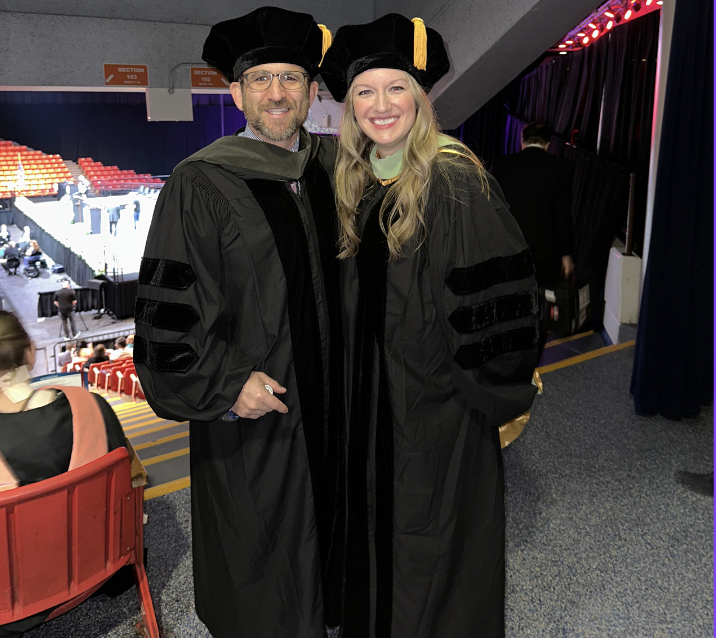Authored by Dr. Leland Jaffe; Associate Dean and Professor; Published on July 11th, 2024
Graduate school and undergraduate experiences can differ more than many anticipate. For students transitioning from undergrad to grad school, the change can be both exciting and challenging.
While undergrad years often focus on broad learning and exploring various subjects, grad school demands deeper specialization and intense focus. Understanding these differences is key to navigating the transition to graduate school and setting clear expectations. This post will outline the main challenges and differences between undergraduate and graduate studies, offering insights for those preparing to take the next academic step.
Academic Expectations
Graduate school brings a whole new set of academic expectations compared to undergraduate studies. While undergrad is often about gaining a broad understanding of various subjects, grad school pushes for deep specialization and intense focus. Let’s explore this difference further.
Depth of Knowledge
One of the biggest differences between undergrad and grad school is the depth of knowledge required. Undergraduate programs are designed to give students a general overview of their field. You get to dip your toes into various subjects and find out what interests you.
In contrast, graduate programs demand a deep dive into one specific area. As Gage Griffen (SCPM Class of 2025) stated – in graduate school, you need to study to understand and retain material, not just do well on a test). Here’s some ways they differ:
- Specialization: Undergrad often involves taking a range of courses in different subjects, even outside your major. However, in grad school, you’ll focus intensely on a narrow area. This specialization allows you to gain expert-level knowledge.
- Research Demands: In graduate school, research is not just an occasional paper; it’s a fundamental component of the curriculum. Often you’ll be expected to contribute new knowledge to your field. This might mean conducting experiments, doing case studies, or even writing a thesis or dissertation (in a PhD program). Research often plays a central role in your grad school journey.
- Critical Thinking: While undergrad requires critical thinking, graduate school takes it to another level. You will need to analyze complex theories, question existing knowledge, and develop your own hypotheses. It’s no longer about memorizing facts but about questioning them.
- Independent Learning: Graduate school expects you to take charge of your learning. Professors are there to guide you, but much of the responsibility falls on you. You will need to seek out resources, manage your time effectively, and stay motivated without constant supervision like in undergrad. (see blog post on Habits To Help You Become A Lifelong Learner)
- Higher Expectations: Academic work in graduate school is more demanding than undergrad. Expect more extensive reading, deeper analysis, and higher standards for writing and projects. Coursework is not just longer but also more intricate.


Understanding these differences in depth can be vital for anyone transitioning from undergrad to grad school. It’s crucial to realize that a graduate degree isn’t just a continuation of college but a step toward becoming a specialist in your field. By embracing these challenges and expectations, you can make the most of your grad school experience.
Time Management
Time management is a critical skill for both undergraduate and graduate school students. However, the demands on your time can differ significantly between these two stages of education. Let’s break down these differences to better understand how to manage time effectively at each level.
Course Load and Assignments
Undergraduate and graduate programs come with very different expectations when it comes to course load and assignments.
- Undergraduate Course Load
- In undergrad, students typically take around 12-15 credit hours per semester. This usually means about 4-5 classes.
- Assignments often include a mix of exams, essays, and projects designed to give a general overview of various subjects.
- Graduate Course Load
- Graduate students usually take a similar or greater number of classes (contact hours)
- However, the depth and intensity of each course are much greater. Also keep in mind that most graduate programs do not have a curriculum that can be adjusted, as in undergrad. For example, you cannot drop a class in the fall and take it in the spring in graduate school.
Balancing Responsibilities
Balancing academic responsibilities with other commitments is another significant challenge, especially in graduate school.
- Undergraduate Balancing Act
- Many undergrads juggle classes with part-time jobs, extracurricular activities, and social lives.
- Time management is essential, but the stakes are generally not as high.
- Graduate Balancing Act
- Graduate students often face a more complex juggling act. They might be balancing their coursework with teaching responsibilities, research projects, and sometimes even part-time jobs or internships.
- The demands are higher, and the time management skills required are more advanced.
- Tips for balancing these responsibilities include creating a detailed schedule and prioritizing tasks. For further insights, you can read about work-life balance in graduate school on Rice University’s website.
- Managing Stress and Avoiding Burnout
- Effective time management can help reduce stress and prevent burnout. Make sure to allocate time for self-care and breaks.
- Utilize campus resources like counseling services and academic advisors to help manage your workload and maintain a healthy balance.
Understanding these aspects of time management can make a world of difference for students navigating the transition from undergrad to grad school. By mastering these skills, you can set yourself up for success at any academic level.
Social and Support Networks
Navigating the social and support networks in graduate school can be vastly different from the undergraduate experience. You’re not just transitioning academically but also socially. Here’s what you need to understand about forming peer relationships and finding mentorship and advising in grad school.
Peer Relationships
In undergraduate school, your peers often become your closest friends. You meet people in dorms, classes, and social events. The environment is designed to encourage social interactions. But how do these relationships change in graduate school?
- Undergraduate Friendships:
- Friendships in undergrad are primarily formed through shared experiences. Living in dorms and attending commonplace social events help foster close-knit groups.
- It’s relatively easy to meet new people and create lasting bonds.
- Graduate Peer Relationships:
- In grad school, the social scene shifts. Many students are more focused on their academic and professional goals. People might live off-campus or have other commitments like families or jobs, sometimes making it harder to socialize.
- Interactions are more likely to happen in professional settings like study groups, research labs, and academic conferences.
- Nature of Support:
- Undergrad support often comes from a broad peer network. The larger, more diverse student body allows for a wide array of support systems.
- In grad school, support networks often narrow to include those within your specific field. This can be beneficial for academic and career advice but might lack the emotional support found in broader undergrad friendships.
Mentorship and Advising
One of the most crucial aspects of graduate school is the mentorship and advising you receive. While undergrad advisors help you navigate course selections and degree requirements, graduate advisors have a more nuanced role.
- Undergraduate Advising:
- Advising at the undergraduate level tends to be more generalized. Advisors help you pick classes, talk about academic performance, and sometimes offer career advice.
- The relationship is often less intense, with fewer one-on-one meetings.
- Graduate Mentorship and Advising:
- In graduate school, advising becomes more specialized. Your advisor is usually a faculty member who is an expert in your field. They help guide your research, offer professional development advice, and assist in networking within the academic community.
- The mentorship dynamic can be very influential, shaping your academic focus and career trajectory. Good mentors can make a significant difference in your grad school experience.
- For more insights into the importance of mentorship and advising, you can explore the Faculty Guide to Advising Research Degree Students at Cornell University.
- Building the Relationship:
- Initiate regular meetings with your advisor to discuss progress and challenges.
- Seek out additional mentors within your department or professional community to round out your support network.
- Involvement in academic groups and forums can provide additional mentorship opportunities and enhance your academic experience. The UChicagoGRAD program outlines how beneficial these relationships can be.
Understanding these shifts in social dynamics and support networks is crucial for surviving and thriving in graduate school. Building strong peer relationships and finding the right mentorship can be key to a successful graduate experience.
Financial Considerations
Pursuing higher education involves financial commitments that impact your overall experience. Whether you’re transitioning from undergrad to graduate school, understanding the financial challenges is essential. Below, we break down the differences in tuition, funding, living expenses, and financial management.
Tuition and Funding
Graduate school often comes with a higher price tag compared to undergraduate programs. While tuition costs can vary widely, here are some key points to consider:
1. Tuition Costs:
- Undergraduate: The cost for an undergraduate degree generally ranges widely, with bachelor’s programs averaging around $9,000 per year for in-state students at public universities, and significantly higher at private institutions according to Pacific College.
- Graduate: Graduate program tuition is generally higher per credit hour. For instance, total tuition for certain two-year, full-time graduate degrees can exceed $100,000 as noted by U.S. News.
2. Funding Opportunities:
- Undergraduate Funding: Many undergraduates receive federal aid, scholarships, and grants, with need-based aid being more common.
- Graduate Funding: Graduate students often rely on different types of financial support. These may include fellowships, assistantships, or grants. Federal loans are still an option, but scholarships are usually less frequent compared to undergrad. For more details, check Academia Stack Exchange.
Living Expenses and Financial Management
Managing your finances involves more than just tuition. Daily living expenses and financial responsibilities often change when transitioning to graduate school.
1. Living Expenses:
- Undergraduate Living: Undergraduates often live in dorms or shared apartments, with meal plans offered by the university. These costs are sometimes bundled with tuition.
- Graduate Living: Grad students tend to live off-campus, which can mean rent, utilities, groceries, and transportation add up quickly. It often requires a detailed budget to keep expenses in check. The CSU Long Beach site offers excellent advice on managing these costs.
2. Financial Management Tips: Graduate students face unique financial challenges and responsibilities, necessitating effective financial management strategies. Here are some helpful tips:
- Budget Creation: List out all your financial responsibilities, including rent, groceries, transportation, and tuition.
- Debt Management: Graduate students often have to deal with debt from undergraduate loans. It’s important to prioritize high-interest debt and manage it smartly. For more insights, check out our blog on managing student loans.
- Savings and Investments: If possible, set aside some savings each month to build an emergency fund. This can help you handle unexpected expenses without derailing your education or well-being.
Understanding these financial considerations can set you up for a smoother transition from undergraduate to graduate school. Balancing tuition costs, finding appropriate funding opportunities, and managing living expenses effectively are crucial steps in your academic journey.


Career Preparation and Opportunities
The transition from undergraduate to graduate school marks a significant shift in how students prepare for their future careers. Graduate programs often offer more tailored career development resources and opportunities.
Professional Development
Graduate school provides vast opportunities for professional development and networking. Unlike undergraduate programs, which may offer general career advice, graduate studies often focus on specialized skill-building and industry connections.


Graduate programs actively encourage students to:
- Attend Workshops and Seminars
- Engage in Networking Events: Graduate students have numerous opportunities to attend industry conferences, academic forums, and networking events, providing direct access to professionals in their field.
- Utilize Mentorship Programs: Many graduate programs connect students with mentors who are experienced professionals.
- Participate in Internships and Practicums: Hands-on experience is part of the curriculum, often through internships or practicums that offer real-world insights and job skills.
These activities are designed to equip graduate students with the tools they need to excel in their careers and build meaningful professional relationships.
Job Market Readiness
When it comes to job market readiness, the difference between undergraduate and graduate career services can be stark. Both levels of education offer support, but the scope and depth of that support can vary significantly.
Undergraduate Career Services:
- General Career Fairs: Typically, undergraduate career services focus on general job fairs and broad job search strategies.
- Basic Resume and Interview Preparation: These services often include basic resume writing workshops, interview practice sessions, and career counseling.
- Entry-Level Job Placement: The goal is usually to help students find entry-level positions or internships that align with their field of study.
Graduate Career Services:
- Specialized Job Fairs: Graduate schools often host career fairs that are specific to certain industries or fields, providing more targeted opportunities.
- Advanced Career Workshops: Graduate programs may offer advanced workshops on negotiations, leadership training, and specialized job application techniques. For example, NACE Web offers insights on employer expectations and the competencies required for career readiness.
- Professional Networking: Graduates benefit from more robust networking opportunities, including connections with alumni and industry experts.
- Targeted Job Placement: The objective is to place graduates in roles that precisely match their expertise and career goals, ensuring a smoother transition into higher-level positions.
Understanding the resources and support available at both levels can help students make informed decisions about their educational paths and preparations for entering the job market. Graduate programs offer more intensive and targeted career preparation that aligns closely with professional goals, providing a clear edge over undergraduate services in terms of job market readiness.
Graduate School Versus Undergrad: Conclusion
Navigating graduate school presents unique challenges distinct from the undergraduate experience. Academic expectations rise sharply, with a focus on specialization and in-depth research. Time management becomes critical as the workload intensifies and balancing responsibilities demands advanced organizational skills. Social dynamics shift towards professional relationships, making mentorship and networking crucial.
Financial considerations also change, with higher tuition costs and varied funding opportunities. Students need to manage living expenses carefully. Career preparation in graduate school is more tailored, offering specialized workshops and networking opportunities, and preparing students for advanced roles.
Being well-prepared for these challenges is essential for success in graduate school. Understanding the differences and planning accordingly can make the transition smoother and more rewarding. Embrace these challenges and use them as stepping stones toward academic and professional growth.







